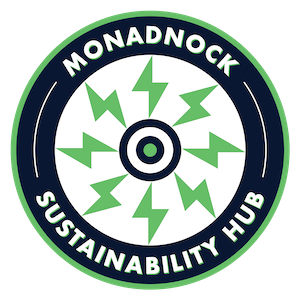By MSH Board Member, John Kondos.
Originally Published in The Monadnock Shopper News, Green Monadnock column, April 2021.
Learn more about electric vehicles at the Hub’s Virtual Drive Electric Earth Day EV Expo, launching April 22. Visit monadnocksustainabilityhub.org/ev-expo to learn more!
As an electric vehicle (EV) owner, my answer is the technology & performance along with the cost & ease of ownership are better. The major reasons I’ve heard why someone hesitates to get an EV are- anxiety about running out of juice, not enough choices and they’re expensive.
Recently the CEO of VW said that “E-mobility has won”. VW is committing $29BN to EVs because batteries beat internal combustion engines. EVs are three times more efficient, requiring a lot less fuel/mile. Battery technology has been transformed by laptops and phones which have driven prices down and encouraged mass production. EVs have less than ½ the number of parts, so maintenance is reduced. In over 20,000 miles, my only maintenance was a new cabin air filter. The convenience of charging at home means I rarely need a public charger making ‘fueling’ much cheaper than low-priced gas, with no worries about gas prices rising. Imagine no more pumping gas or oil changes. The simplicity, reliability and convenience of charging at home make EVs really easy to own.
I’ve driven a wide range of cars and my Chevy Bolt is one of the best in terms of performance- the low, centered weight distribution results in great handling, the direct torque from the electric motor makes it very quick, it’s smooth, quiet and fun to drive.
Pictured above – John with his Chevy Bolt EV
About those concerns.
As far as running out of watts, it’s getting less likely as charging infrastructure expands. If you buy a Tesla you have no worries since they’ve built a nationwide network. Other EVs rely on a robust EV charging industry spreading across the US w/ brands like Chargepoint, EVgo, Blink and Electrify America.
EV choices are expanding fast. Chevy, Ford, Nissan, Kia, VW, Tesla, Rivian and others have launched exciting new vehicles, some have sold out as soon as they become available. Volvo, Jaguar, GM and others are talking about when they’ll make only EVs. These companies realize EVs are better. If we don’t make more, China may own this industry too.
As for being expensive, Nathaniel Bullard of BloombergNEF recently pointed out these current auto market trends: “the disappearance of the inexpensive new car, the high penetration of leasing for luxury brands, and the high true market value for luxury vehicles (average price paid across the brand)— gives me reason to think that EV sales could move quickly.” Over 50% of cars bought in the USA in 2020 cost over $40,000. EVs including the Chevy Bolt, Kia Niro and Nissan Leaf are under $40K. Used EVs are also becoming more available.
Leasing makes luxury vehicles more accessible, which can work for EVs. In addition, an analysis from BloombergNEF found that “upfront cost parity” for U.S. electric and internal combustion vehicles will arrive in 2024. That’s when it will no longer cost more to buy the superior tech. With less than half the parts and falling battery costs, EVs will be the best low-cost new car option within a few years.
Locally MSH is working to get the region’s 1st EV fast charger installed at the Co-op and has hosted at least one Drive E event a year since 2018. For Earth Day, 2021 watch for our Virtual Drive Electric Expo: a short feature film and a wider collection of local EV owner’s stories & vehicle profiles. See what it’s all about and sign up for a launch day alert at monadnocksustainabilityhub.org/ev-expo.
EVs are better tech, easier & cheaper to own while reducing greenhouse gasses. May the Torque be with you.
Author Bio
John Kondos is a founder of the Monadnock Sustainability Network, Home-Efficiency Resources and the Monadnock Chapter of Citizen Climate Lobby. He started his career in the renewable energy industry in the late 1970s with the goal of making a practical contribution to reducing our dependence on finite fossil fuels. He began at the contractor level and went on to work at a crystalline and later at a thin-film PV manufacturer.
John returned to solar in 2007 after a number of years in other industries. He has installed PV systems on three continents and solar water heaters in MA, NH and VT. John has a Masters in International Management from the Thunderbird School of Global Management and a BA from Fairfield University. He is committed to working on solutions to our greatest challenge – climate change caused by fossil fuel combustion – through energy conservation, renewable energy and land stewardship.

